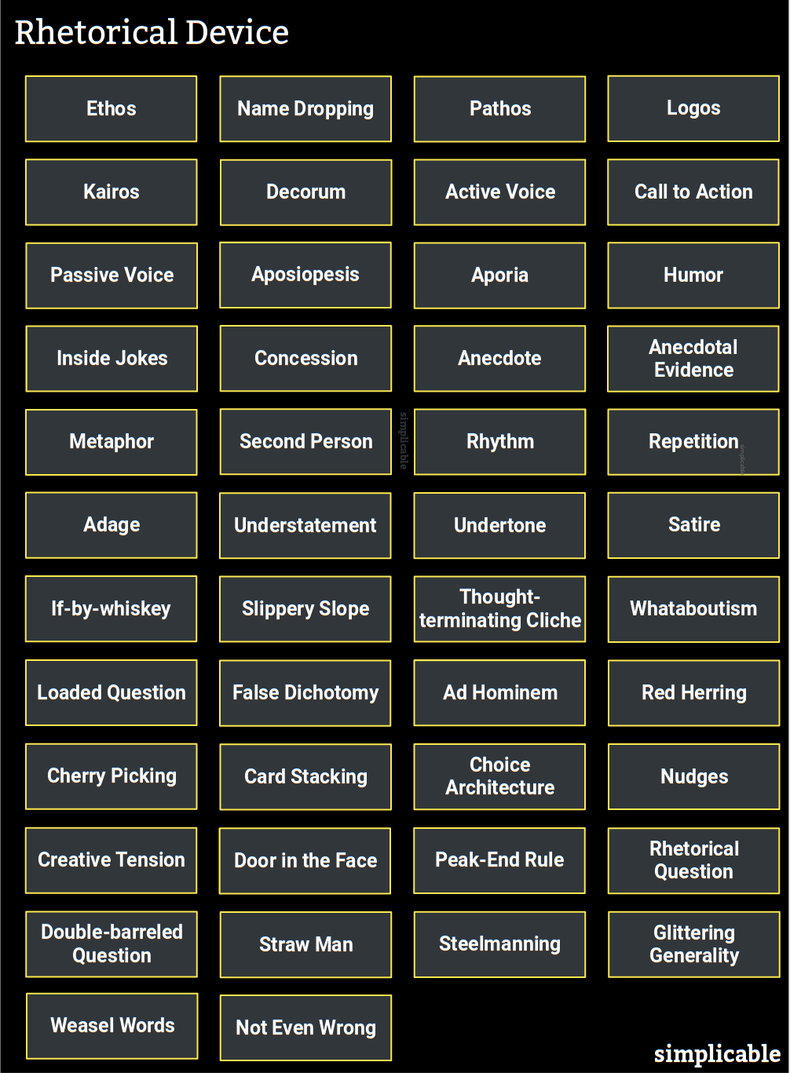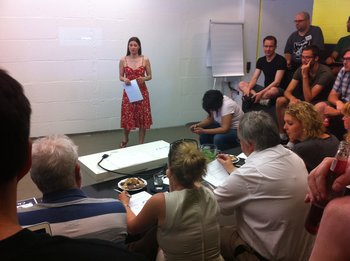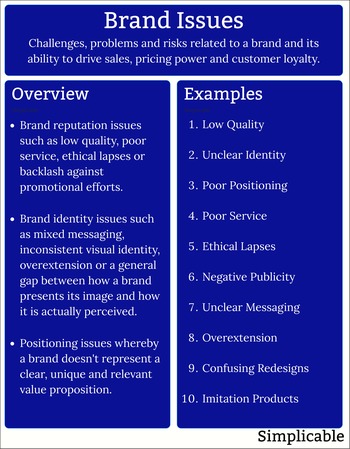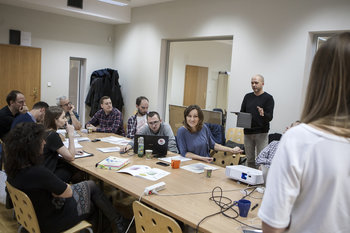
Ethos
An appeal to authority including social status, formal authority, knowledge, experience, creativity and success.My whole life is about winning. I don't lose often. I almost never lose. ~ Donald Trump
Name Dropping
Mentioning your distant association with high status people and institutions. Considered pathetic but name dropping often works to establish authority nonetheless. For example, "I was at Harvard last week and ...." Name dropping can backfire if detected by an intelligent audience.Pathos
An appeal to emotion such as fear, greed, pride, love and hate.Do not pray for easy lives. Pray to be stronger men.~ John F. Kennedy [Quoting Reverend Phillips Brooks]
Logos
An appeal to logic.When you have got an elephant by the hind legs and he is trying to run away, it's best to let him run. ~ Abraham Lincoln
Kairos
An appeal to urgency. This includes suggestions that the time is right or that you are falling behind the pace of change.We choose to go to the moon in this decade and do the other things, not because they are easy, but because they are hard, because that goal will serve to organize and measure the best of our energies and skills, because that challenge is one that we are willing to accept, one we are unwilling to postpone, and one which we intend to win.~ John F. Kennedy
Decorum
Using the appropriate level of language and argument for an occasion according to the norms of society and culture. For example, witty attacks that do not technically violate any rules of civility.I wish Stanley Baldwin no ill, but it would have been much better if he had never lived.~ Winston Churchill
Active Voice
Active voice is a grammatical structure whereby a subject directly performs a verb. This makes it clear who did something and is considered a high impact way to take credit for action.I shook up the world, I shook up the world.~ Muhammad Ali
Call to Action
A call to action is a direct demand to your audience to perform a desired action such as "buy now!"Passive Voice
Making what would normally be the object of a sentence the subject in order to detach a person or thing from an action. Often used to avoid blame such as "mistakes were made" as opposed to "I made a mistake."Aposiopesis
The strategic use of silence. For example, allowing a long uncomfortable silence to take place after your opponent slips up.Drawing on my fine command of the English language, I said nothing. ~ Robert Benchley
Aporia
An expression of doubt — often feigned in order to support the very thing you are doubting.I don't think it's proving anything, Doc. As a matter of fact, I don't even know what it means. It's just one of those things that gets in my head and keeps rolling around in there like a marble.~ Columbo, Peter Falk
Humor
Generally speaking, people prefer to be entertained rather than to consume information and think about serious problems. Humor wakes audiences up and engages them.I did not attend his funeral, but I sent a nice letter saying I approved of it.~ Mark Twain
Inside Jokes
Humor that requires membership in a group to understand. Helps to build rapport by highlighting commonalities. Inside jokes can also be used in a negative way to highlight that someone doesn't fit into the group.Concession
Making a concession to an opponent by agreeing to part of their argument. This is often done to show that you aren't disagreeing with the strongest part of their argument but with the weakest part.When someone tells me, 'Oh, we have so many problems on Earth; space exploration costs too much money,' I say, 'I absolutely agree with you. But I still hope we do it.' ~ Mary Roach
Anecdote
A short personal story that is often designed to build rapport with an audience. People are more easily influenced by people they find likeable.Anecdotal Evidence
Evidence based on personal experience or the experience of someone else. Such evidence is typically extremely weak as it is statistically insignificant to judge things from a single person's experience. For example, "seat belts aren't good -- I knew someone who got in an accident and was thrown safely from the car before it exploded -- if they had been wearing a seat belt they wouldn't have made it."Metaphor
Drawing comparisons between starkly different things such as "heart of gold."This monstrous product of former wrongs and shame has now resolved to try to break our famous island race by a process of indiscriminate slaughter and destruction. What he has done is to kindle a fire in British hearts which will glow long after all traces of the conflagration he has caused in London have been removed.~ Winston Churchill (Sept. 11, 1940 radio address responding to the bombing of London by Germany)
Second Person
Second person perspective is a tool of influence because it frames everything in terms of the audience using "you" and "your." This is considered more effective than first person pronouns such as "I" or third person pronouns such as "he", "she" and "it."Emancipate yourselves from mental slavery.~ Redemption Song, Bob Marley
Rhythm
Patterns in the structure of your speech or writing. The primary type of rhythm is the length of your sentences. Long sentences are comfortable and establish flow. Short sentences have more impact.You have to be smart. The easy days are over. ~ Robert Kiyosaki
Repetition
Repetition is the repeated use of the same words or sentence structure. This is typical of both terrible and brilliant writing. In the latter case, repetition is done to create effect and transfer meaning.Hatred was spreading everywhere, blood was being spilled everywhere, wars were breaking out everywhere.~ Shusaku Endo
Adage
A concise statement that most people would accept as true and meaningful. Where an adage is a traditional saying, it is known as a proverb. Widely overused adages can be considered cliches. For example, "Rome wasn't built in a day."Understatement
Saying things in a less dramatic way than expected given the context. Tends to garner respect.Undertone
Establishing a non-obvious theme to your work that conveys meaning that might be too brash or politically dangerous to say directly. For example, a presentation of a business plan at a company that subtly suggests that the firm's leadership is incompetent.Satire
The use of humor to criticize fair game. For example, a comedy skit that uses parody to portray political leaders as foolish.If-by-whiskey
An argument that attempts to appease both sides of a controversial issue in a contradictory way. Named for a remarkable speech by Noah "Soggy" Sweat.Slippery Slope
Suggesting that a relatively small change will lead to a disastrous and unstoppable chain reaction. This is usually weakly supported by evidence as modeling a chain reaction is a complex undertaking. As such, a slippery slope is most often an overdramatization designed to invoke emotion such as fear. However, the idea of a slippery slope is important as they do indeed exist.I think it would be a mistake for social media companies to try to, on their own, determine or deign what is a fake news story and what isn't and shut it off, or what's a good news organization or a bad news organization. That's a very, very slippery slope.~ Vivian Schiller
Thought-terminating Cliche
A slogan, label or proverb that is used as a substitute for thought and debate. For example, "that's just human nature."Whataboutism
Suggesting a wrong is tolerable because of some other wrong. For example, suggesting it is right for your country to pollute the environment because some other country does it.Loaded Question
A question that contains an unjustified assumption.Should a smack as part of good parental correction be a criminal offense in New Zealand?~ 2009 referendum on corporal punishment in New Zealand (considered a loaded question because it specifically implies that hitting a child is good parenting)
False Dichotomy
Incorrectly asserting that there are only limited options where there are in fact many. This often takes the form of labeling anyone who doesn't agree with you.Either you are with us, or you are with the terrorists.~ George W. Bush
Ad Hominem
Attacking your opponent as a person as opposed to attacking their argument.What can you do with a man who looks like a female llama surprised when bathing?~ Winston Churchill (speaking of Charles de Gaulle)
Red Herring
An irrelevant argument that serves as a distraction. For example, the chewbacca defense.Cherry Picking
Choosing the facts that support your claim and ignoring those that do not.Card Stacking
Ostensibly presenting both sides of an argument but presenting one side with strong evidence and the other with weak evidence.Choice Architecture
Leading the audience through a series of choices that are structured to heavily favor a certain choice or outcome. For example, a salesperson who begins by asking a customer what model, color, options and financing choices they want. This is done to create and escalate the customer's sense that they have already committed to a purchase.Nudges
The idea that people are more responsive to gentle suggestions and interaction than commands and declarations. For example:Command | You should think about your actions and start behaving responsibly to save the planet! |
Declaration | We must to save the environment now! |
Nudge | Can you think of any ways to reduce pollution? |
Creative Tension
Persuasion requires an embrace of intensive arguments, disagreement and discord. Poor influencers avoid tension and skilled influencers create it and thrive on it.Non-violent direct action seeks to create such a crisis and establish such creative tension that a community that has constantly refused to negotiate is forced to confront the issue. It seeks so to dramatize the issue that it can no longer be ignored... I am not afraid of the word tension. I have earnestly worked and preached against violent tension, and there is a type of constructive tension that is necessary for growth.~ Martin Luther King, Jr.
Door in the Face
Making an outrageous statement, proposition or offer so that what you say later seems more reasonable and is more easily accepted. For example, an academic speaking about education reform may begin by suggesting that all schools be torn down because they are useless and children be freed to do as they like. This may be followed by a more reasonable idea such as mastery learning.Peak-End Rule
The theory that many people only remember the start and the end of a presentation or written work. According to the theory, a speech with a great opener and closer will be perceived positively even if the middle is a complete failure.Rhetorical Question
A question that isn't meant to be answered. Often used to wake an audience as people listen for questions in case they are called upon to speak. A rhetorical question also typically gets the audience or reader thinking about the question.Double-barreled Question
A question that contains two parts with one part being contentious and the other being non-contentious. By answering yes, a respondent looks like they are agreeing to the contentious part of the question. By answering no, a respondent looks like they are disagreeing with the non-contentious part of the question. The only safe route is to challenge the question itself. For example:Are you satisfied with your pay and me as a manager?
Straw Man
Refuting an argument your opponent has not made.A: we should make the streets safe for bicyclistsB: so we should shutdown all the streets to ambulances, trucks, commuters and commerce just so that you can enjoy your personal hobby?Steelmanning
Making your opponent's argument stronger before attacking it.A: we should cancel all environmental lawsB: so you believe that industries can self-regulate to improve the environment? The history of self-regulation shows that ...Glittering Generality
Short, vague emotional phrases that are a pathetic argument. Glittering generalities can be effective nonetheless because people tend to think in emotional ways. For example, "this plan will give hope to hardworking families – decent people who respect others."Weasel Words
Pretending that you have facts with unsubstantiated statements such as "people say", "experts agree", "it is said" and "science has discovered that."Not Even Wrong
A statement that is so preposterous, vague, disconnected from reality and poorly structured that it is difficult to counter with logic.| Overview: Rhetorical Device | ||
Type | ||
Definition | A technique that a writer or speaker uses to persuade. | |
Related Concepts | ||
























